If you’re on a mission to boost your protein intake while keeping carbs in check, you’re in the right place. Whether you want to lose fat, build muscle, or maintain a balanced and healthy lifestyle, high-protein, low-carb foods can be valuable additions to a healthy diet.
Protein is one of the three primary macronutrients (along with carbs and fats). It’s required for tissue repair, helping you stay full, and immune function. Although carbs are a vital fuel source for your body, research suggests consuming them in moderation can support healthy weight management.
According to a 2021 study, eating a diet high in protein and low in carbs can help stabilize blood sugar levels, which is particularly beneficial for those with diabetes or those at risk of developing it. Another study found that a low-carb diet can help improve heart health by reducing triglycerides, a type of fat in the blood associated with heart disease risk.
We chatted with nutrition experts who shared the 25 best protein-rich, low-carb foods that are both nutritious and delicious, making them excellent choices for anyone looking to improve their overall health and well-being with a high-protein diet. Read on, and when you’re done, be sure to check out these 25 superfoods that are surprisingly high in protein.
Beef Jerky
Calories: 60
Protein: 10 grams
Carbs: 0 grams
Beef jerky is an ultra-convenient, high-protein snack that’s perfect for on-the-go. Destini Moody, RDN, CSSD, LD, a registered dietitian and sports dietitian with Garage Gym Reviews, says, “Almost no carbohydrates or fats are present in beef jerky, so the snack is almost all protein. Keeping something like this in your bag when hunger strikes will be much more satisfying and stick with you longer than a bag of chips.” Choose beef jerky products that are low in fat and sodium whenever possible.
Shrimp
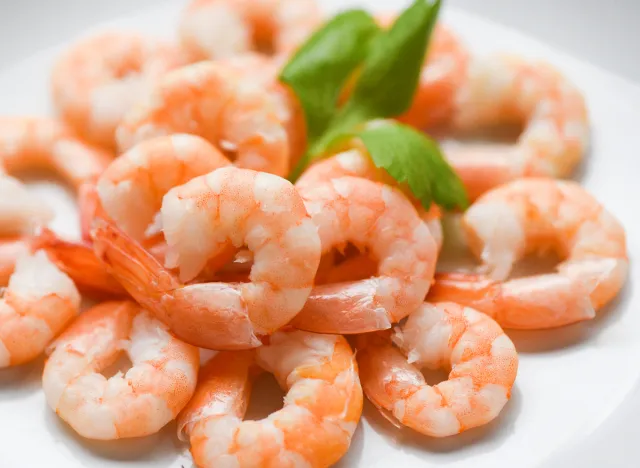
Shrimp is a low-calorie, high-protein seafood rich in nutrients like selenium and omega-3s that support heart health and immune function. “Like most animal protein sources, shrimp virtually zero grams of carbs,” Moody says. “Shrimp also has virtually zero grams of fat. This makes it great for heart health and weight control. Grill it up to eat with your salad or as a dipping sauce snack.”
Edamame
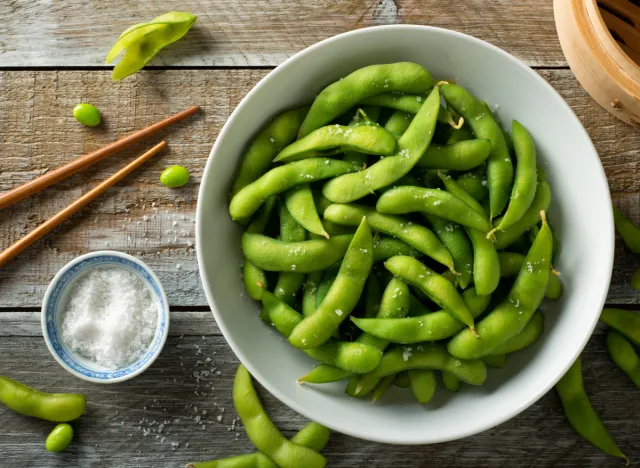
Calories: 94
Protein: 9 grams
Carbs: 7 grams
Edamame, young soybeans harvested before they harden, are a fantastic source of plant-based protein, fiber, and antioxidants. “Edamame is a great snack to have at your desk when you start craving that lunch break a little sooner than you like,” Moody says. “Eating edamame in the pods can also help slow consumption since you have to take the extra time to extract the seeds.”
Eggs
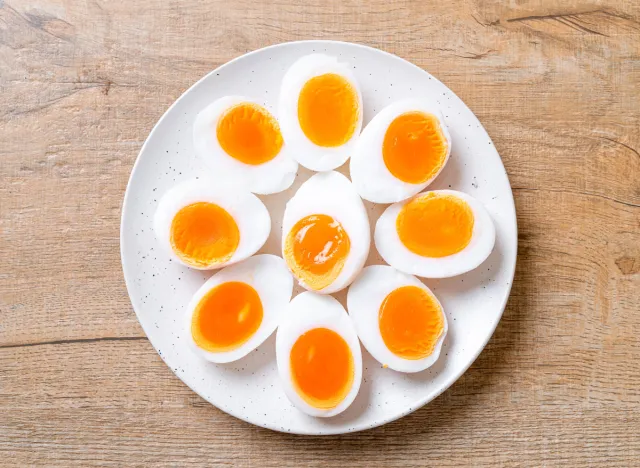
Calories: 72
Protein: 6 grams
Carbs: 0 grams
Eggs are a protein powerhouse and incredibly versatile. “What makes eggs different from dairy sources of high-quality protein is that they are low-calorie and low-carb, allowing them to fit into nearly any diet. Remember not to ditch the yolk as it contains over half of an egg’s protein content,” Moody says.
Almonds
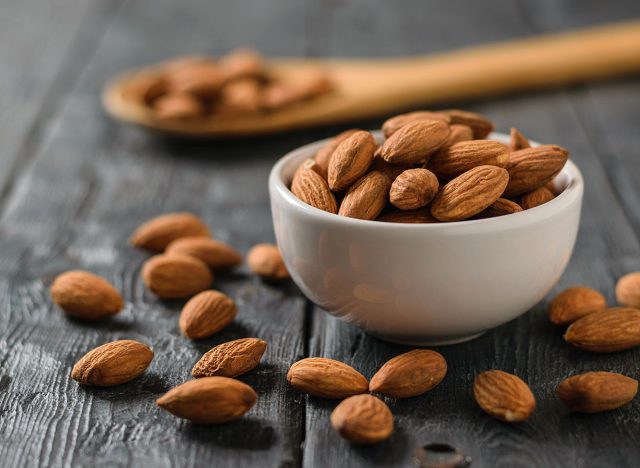
Almonds are a nutrient-dense nut high in protein, healthy fats, and fiber. Recent research suggests daily almond consumption can reduce muscle soreness and recovery time after exercise. Moody tells us, “Of all the common nuts people like to snack on, almonds have the highest protein content. Additionally, the skin on almonds has been shown to help lower harmful inflammation in the body along with its content of vitamin E, which is a powerful antioxidant.”
Tuna
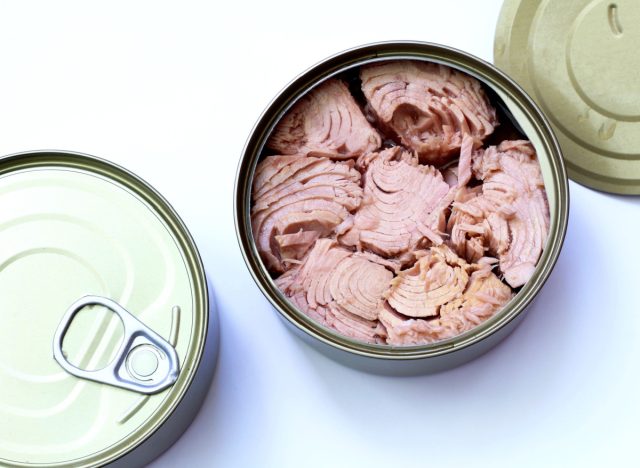
“Canned tuna is a highly underrated lean protein source,” Moody says. “It’s portable, low-cost, and doesn’t go bad quickly, so it reduces food waste. Tuna is also a source of omega-3 fatty acids, an essential nutrient that the body must obtain from food for optimal heart and brain health.” Tuna is also relatively low in calories, making it a wise choice for those looking to boost protein intake without the extra calories.
Whey Protein Powder
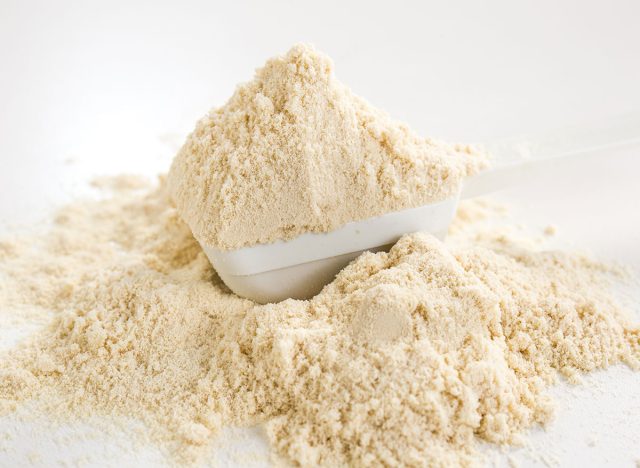
Protein powder is one of the most convenient ways to boost your protein intake while keeping your carb intake in check. Whey protein is an ideal protein source since it’s derived from milk and quickly absorbed by the body. “Whey is a high-quality protein source as it contains all essential amino acids, but is particularly high in leucine, which is the amino acid responsible for turning on muscle building,” Moody says.
Non-Fat Greek Yogurt
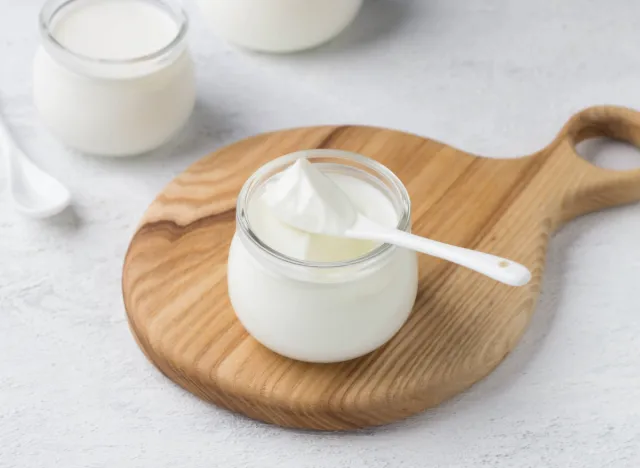
Greek yogurt is a creamy and delicious dairy product high in protein, low in carbs, and rich in gut-friendly probiotics. “What’s great about Greek yogurt is that it’s versatile,” Moody says. “You can add it to smoothies or eat it plain with some added berries or honey.”
Sliced Turkey
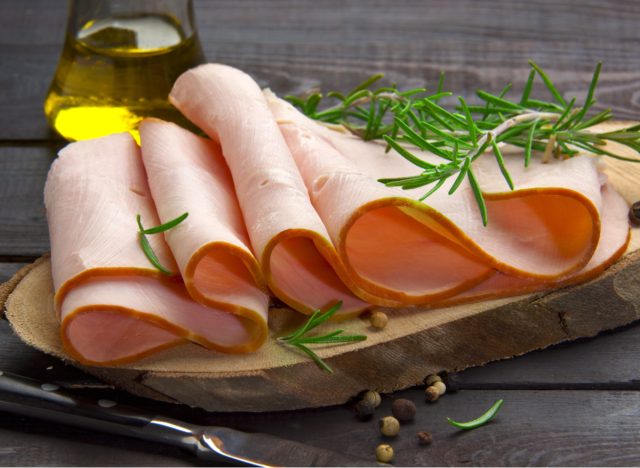
“Sliced turkey is a better option for deli meat than ham or salami, which are higher in calories and saturated fat,” Moody explains. “Don’t limit yourself to eating it only on sandwiches, though. You can chop it up and add it to salads or eat it with whole wheat crackers and low-fat cheese.” Like any deli meat, look for sliced turkey products that are lower in sodium and fat.
Bison
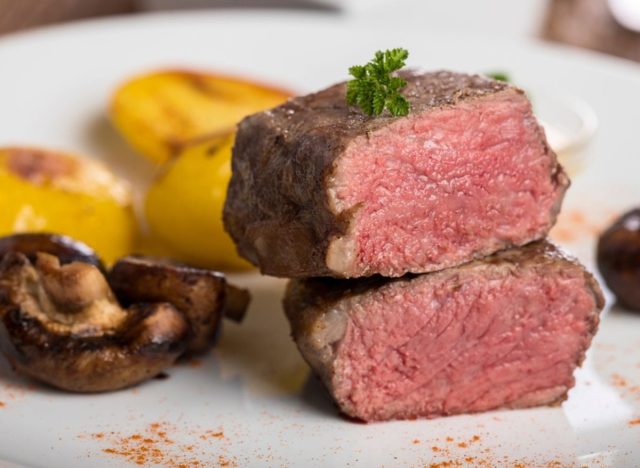
“Game meats like bison, venison, rabbit, or elk tend to be lower in bad fats than the common meats in the grocery store, as the game isn’t subjected to common farming practices that sometimes yield meat with a higher fat content. Wild animals are typically on an organic, grass-fed diet that produces a higher-quality protein rich in flavor,” Moody says.
Hemp Seeds
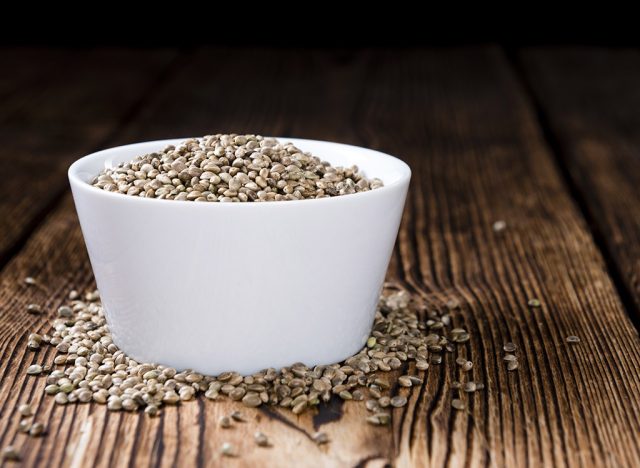
Calories: 166
Protein: 10 grams
Carbs: 3 grams
Hemp seeds are a complete protein source, meaning they contain all nine essential amino acids. They’re also excellent for your heart health since they’re rich in omega-3 and omega-6 fatty acids. “Hemp seeds contain unsaturated fats that can help reduce your risk for heart disease,” Moody says.
Tempeh
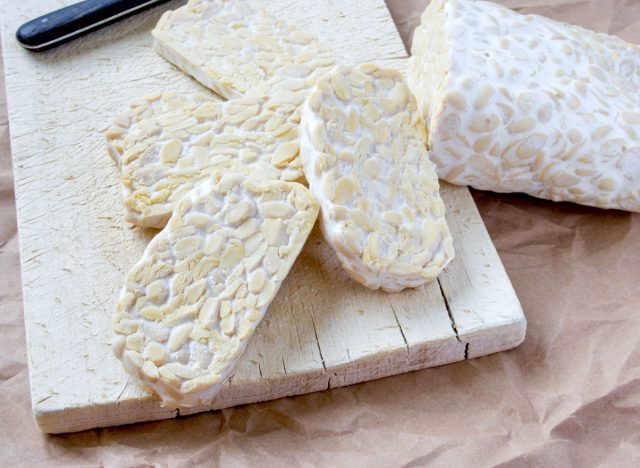
Tempeh is a fermented soy product high in protein and probiotics that makes for a fantastic meat substitute in many dishes. “Tempeh is made from soybeans, which are high in protein and contain all of the essential amino acids while keeping carbs in check,” Moody says.
Pork Tenderloin
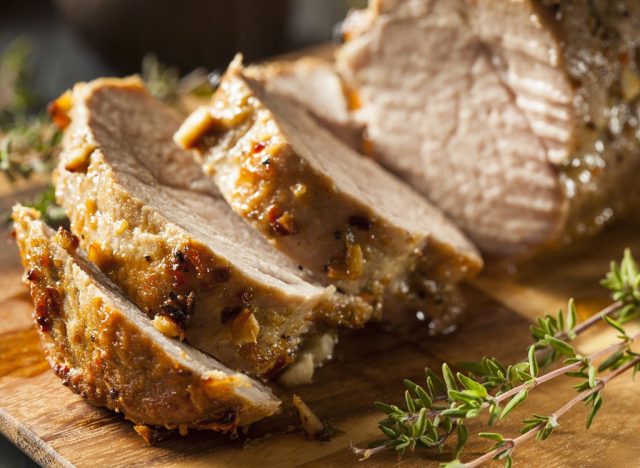
Pork tenderloin is a lean cut of meat low in fat and calories. “If you’re looking for a lean protein source that contains zero carbs to help lose weight or build muscle and need a break from chicken and rice, have a field day by adding some pork tenderloin to your routine,” Moody recommends.
Chicken Thighs
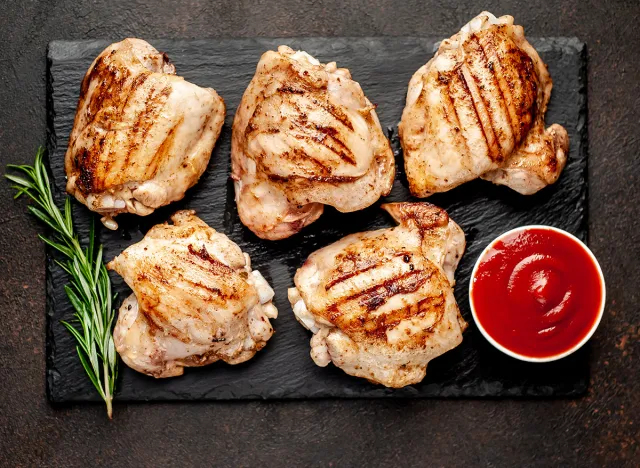
Looking for an ultra-lean protein source that’s also low in fat and carb-free? Then opt for chicken thighs. Gianna Masi, CPT, RDN, a certified personal trainer and registered dietitian with Barbend, recommends it. “A staple in lean protein sources, chicken offers versatility in cooking, with chicken thighs containing fewer calories and thighs providing a richer flavor. Chicken thighs are excellent sources of protein and B vitamins,” she says.
Salmon
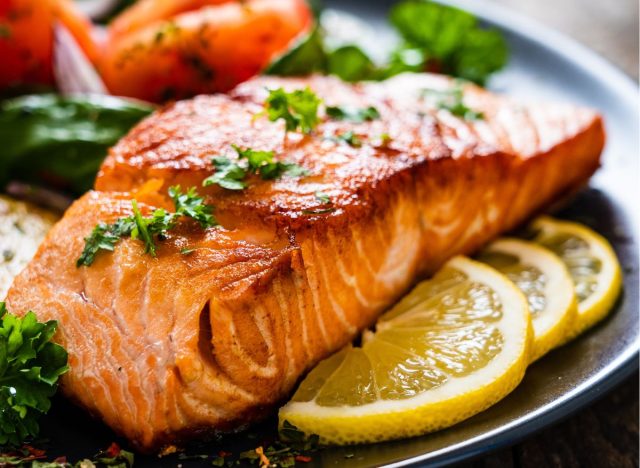
“Salmon is rich in omega-3 fatty acids and provides about 23 grams of protein per 3-ounce serving, which is excellent for heart and brain health. It also contains a significant amount of vitamin D and selenium, which are important for immune function and thyroid health. Including salmon in a diet can help with inflammation, cardiovascular health, and mental clarity,” Masi says.
Turkey Bacon
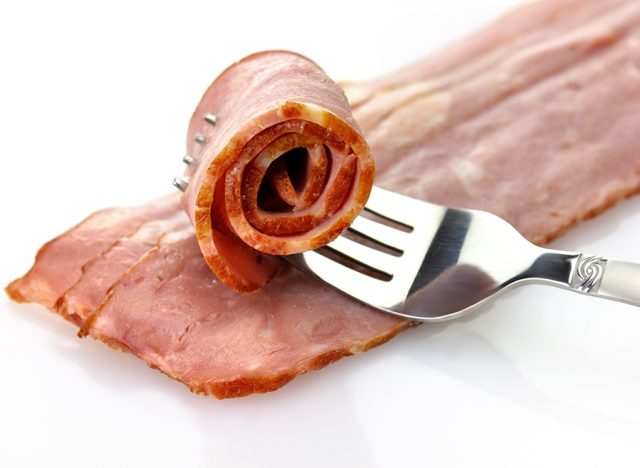
Turkey bacon is a stellar low-carb protein option on sandwiches or salads. “A leaner alternative to traditional bacon, turkey bacon offers the flavor with less fat and fewer carbs and is a complete source of protein,” Masi says. “Turkey bacon also tends to be lower in calories and can be a part of a balanced breakfast or used in recipes as a flavor enhancer.”
Cottage Cheese
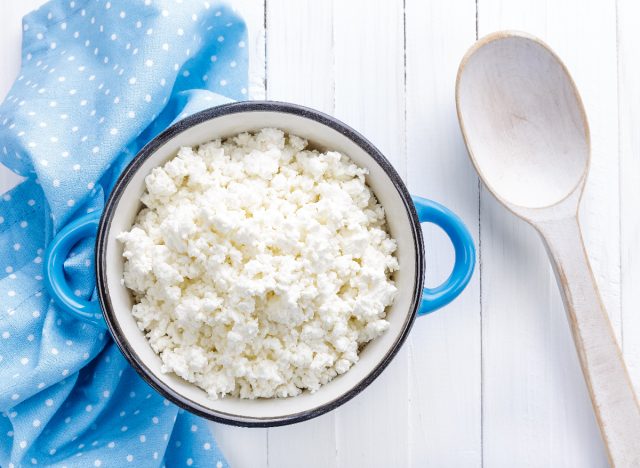
Cottage cheese is a dairy product that’s high in protein and contains few carbs. It’s also a nutrient-dense powerhouse, according to Masi. “Cottage cheese is rich in calcium, which is essential for bone health, and is a good source of phosphorus, selenium, and vitamin B12, which aid in energy production and brain function,” she says.
Steak
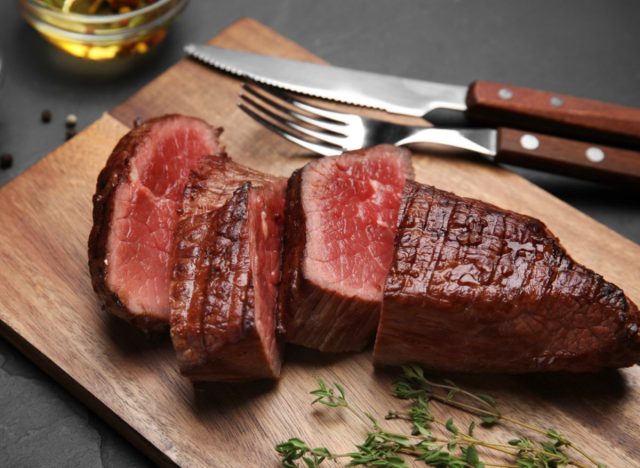
You’d be hard-pressed to find a meat eater who doesn’t love a good steak. Steak is also packed with protein and is another excellent carb-free option for reducing carb intake. “Steak provides high-quality protein and essential nutrients like iron and vitamin B12, though the fat content can vary by cut. Steaks are also rich in zinc, which supports the immune system and wound healing,” Masi says.
Sardines
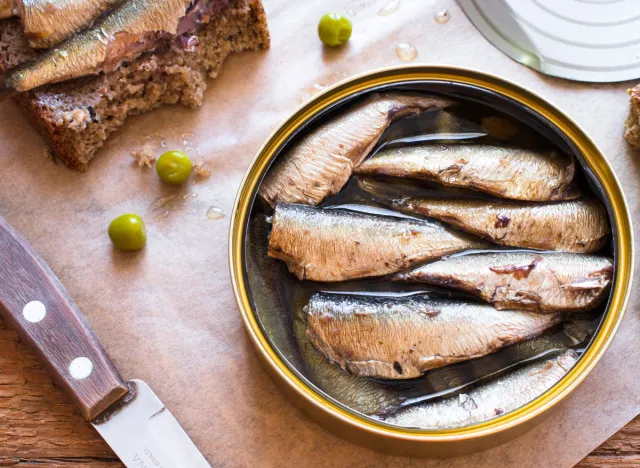
“Compact and nutrient-dense, sardines offer protein and omega-3 fatty acids, making them good for heart health,” Masi explains. “These small fish are also a great source of vitamin D and calcium (when eaten with the bones), which are critical for bone health. They can be consumed straight from the can or added to salads, pasta, and other dishes.”
Non-Fat Ricotta
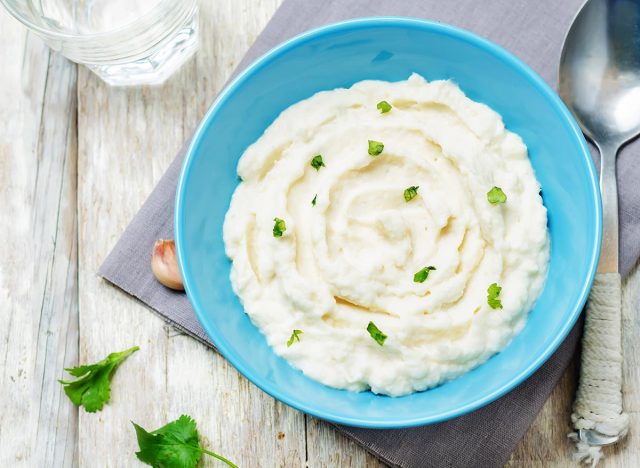
Calories: 50
Protein: 8 grams
Carbs: 4 grams
Non-fat ricotta is a low-carb, high-protein cheese that’s highly versatile and rich in nutrients like calcium. “This cheese variant offers a creamy texture and a good amount of protein, ideal for adding to recipes or enjoying as a snack. It’s also lower in fat than traditional ricotta and is a good source of vitamin A and essential minerals like zinc,” Masi says.
Collagen Powder
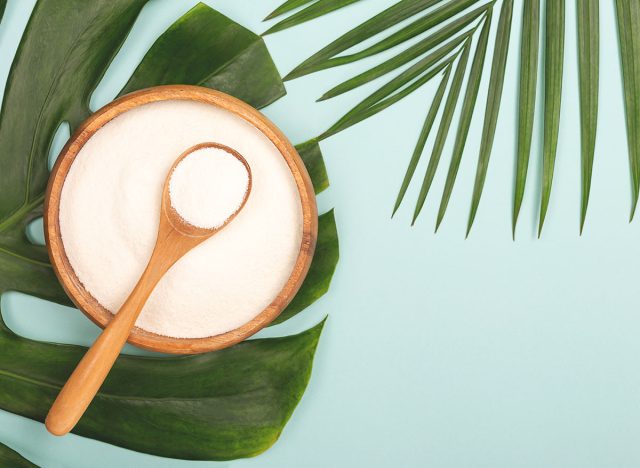
Collagen powder is a protein supplement that’s derived from animal collagen. As for its benefits, Masi says, “Collagen supplements are known for supporting skin, hair, and joint health. It’s also a good addition to beverages for protein intake without carbs. It helps form connective tissue and can improve skin elasticity and hydration. Collagen is also helpful when taken before a workout for joint support.”
Cod
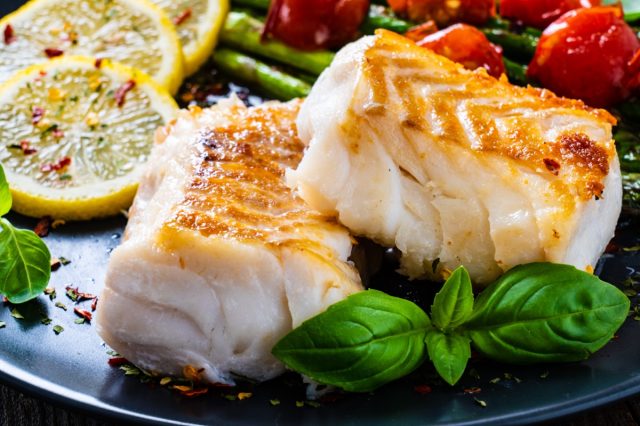
Cod is an underrated fish option packed with protein while containing little fat and zero carbs. Plus, it contains omega-3 fatty acids to help boost heart and brain health. “Cod is a good source of vitamin B12, phosphorus, and niacin, and its mild flavor makes it a versatile choice for various cooking styles, from baking and grilling to poaching,” Masi says.
Seitan
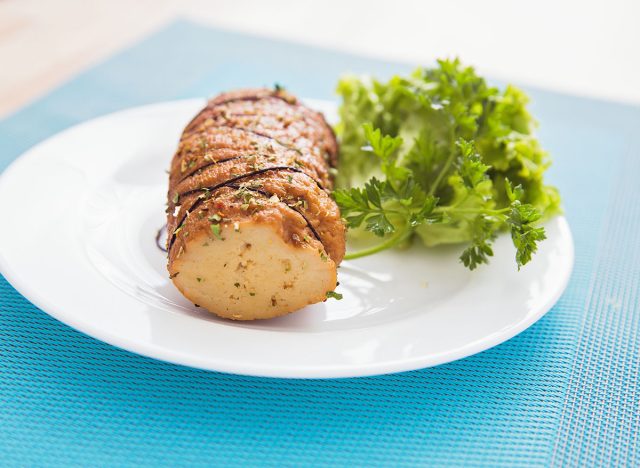
Seitan is a protein-rich meat substitute made from wheat gluten. “Seitan has a meat-like texture and ability to absorb flavors, making it suitable for a wide range of dishes, including stir fries, salads, sandwiches, and grilled plates,” Masi says.
Tofu
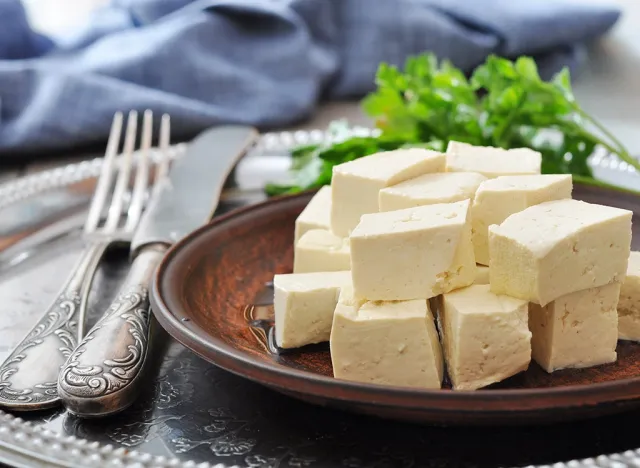
Calories: 94
Protein: 10 grams
Carbs: 2 grams
Tofu is a soy-based protein high in protein and low in carbs. It’s also a stellar plant-based source of iron and calcium. “Tofu is a versatile protein source from soy and is ideal for various dietary needs. Tofu’s versatility allows it to be used in an extensive range of dishes due to its ability to take on the flavor of the ingredients it’s cooked with,” Masi says.
Egg Whites
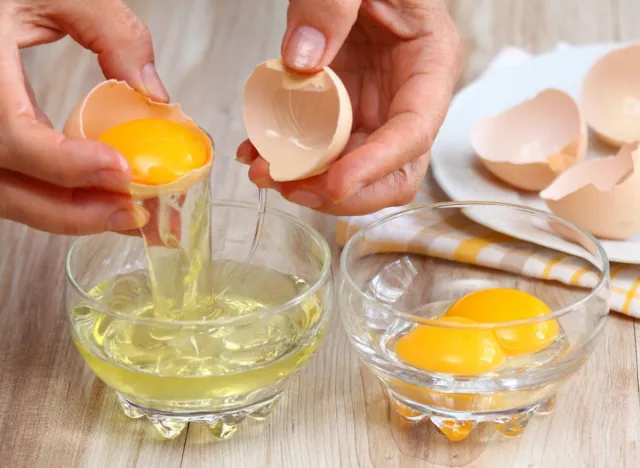
If you’re watching your calorie intake, “Egg whites are a great choice for those seeking a high-protein breakfast,” Masi says. “They contain no fat, carbs, or cholesterol, making them a heart-healthy option. With about 4 grams of protein per egg white, they are a staple in many diet plans focused on lean muscle gain and weight loss. Egg whites are versatile and can be used in omelets, scrambled eggs, or smoothies.”

